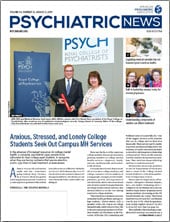As part of the special history-themed sessions held during this year’s Annual Meeting in San Francisco, APA included a session on the engagement and psychiatric treatment of Asian American patients. Though the session focused on clinical practice today, the session also honored and reflected on the groundbreaking work of APA pioneers who helped establish the field of culturally sensitive (or culturally competent) psychiatric care—including the late Luke Ik Chang Kim, M.D., Ph.D. (whose wife was in attendance), Frances Lu, M.D. (also in attendance), and Albert Gaw, M.D., one of the session speakers.
“Asian Americans are an extremely diverse group that vary in religious practice, language, diet, immigration history, and so many other areas,” said another session speaker, Geetha Jayaram, M.D., M.B.A., an associate professor of psychiatry and behavioral sciences at the Johns Hopkins School of Medicine. “These differences are present even within the same subcontinent.”
This diversity poses many challenges when trying to provide culturally appropriate care, but Jayaram and other panelists shared some advice based on their experiences working with Asian American patients.
For example, many Asian cultures emphasize family values, so physicians may often find themselves discussing a patient’s care with multiple people. However, Jayaram advised against using family members as potential translators despite the convenience. “There are usually many layers to what a family member will relay to you. You want someone to translate, not to interpret,” she told the audience.
Hendry Ton, M.D., a professor of psychiatry and associate dean for faculty development and diversity at the University of California, Davis, addressed another common misinterpretation between physicians and Asian patients. “Asian patients commonly say, ‘Yes, doctor,’ when you talk with them, but that does not mean agreement with you. It is just a sign of respect,” he said. This distinction is especially important when discussing medications, as many psychiatrists have heard “Yes, doctor,” only to find out later that the patient did not take his or her medication.
Prescribing medications can be challenging with the Asian population for a multitude of reasons, noted the speakers. These include a strong belief in spiritual medicine and alternative remedies, noted Edmond Pi, M.D., a professor emeritus of clinical psychiatry at the University of Southern California Keck School of Medicine, who chaired the session. “So one should always ask Asian American patients about herbal supplements they might be taking,” he said, as supplements can sometimes interfere with psychiatric medications.
“Among older Asian immigrants in particular, their first introductions to Western medicine was in the form of opiates and antibiotics, drugs that work quickly and need to be taken only for a short time,” added Ton. The idea that a medicine might take weeks to show any effect can be hard to grasp. “If there is a way that you can address some symptoms of the psychiatric disorder immediately, that provides a boost in confidence,” he continued.
Another important consideration is pharmacogenetics, as many Asian populations have genetic differences that result in reduced absorption and slower metabolism of psychotropic drugs. “A good rule of thumb is to treat an Asian American like a geriatric patient: Start low and go slow,” said Jayaram.
The panelists also touched on one common misperception about Asian Americans. “There is this myth of Asian American as a model minority,” said Chuan Mei-Lee, M.D., an assistant professor of psychiatry at the University of California, San Francisco, referring to stereotypes that Asian Americans, as a group, are studious and hard-working immigrants who came here legally.
In truth, nearly 2 million undocumented Asian Americans reside in the country now, and they represent the fastest growing population of undocumented immigrants among any ethnic group, Mei-Lee said. Many of these immigrants, especially those from southeast Asia who were impacted by the Vietnam War and its aftermath, are refugees. “We think of Asian Americans as being pulled to America with feelings of hope and a better future, but for refugees its more about forces—fear, trauma, broken dreams—pushing them out of their country,” Ton said. “And we need to be more cognizant of this population and their needs.”
The issue of undocumented/refugee Asians is one of the more pressing matters for this current generation of psychiatrists, Asian American or otherwise, the panelists agreed. The other is to break down the remaining vestiges of stigma related to mental health care among Asian Americans. Strides have been made, but Asian American culture still retains fears of public shame, failure, and community judgment, which prevents many from seeking care. ■

